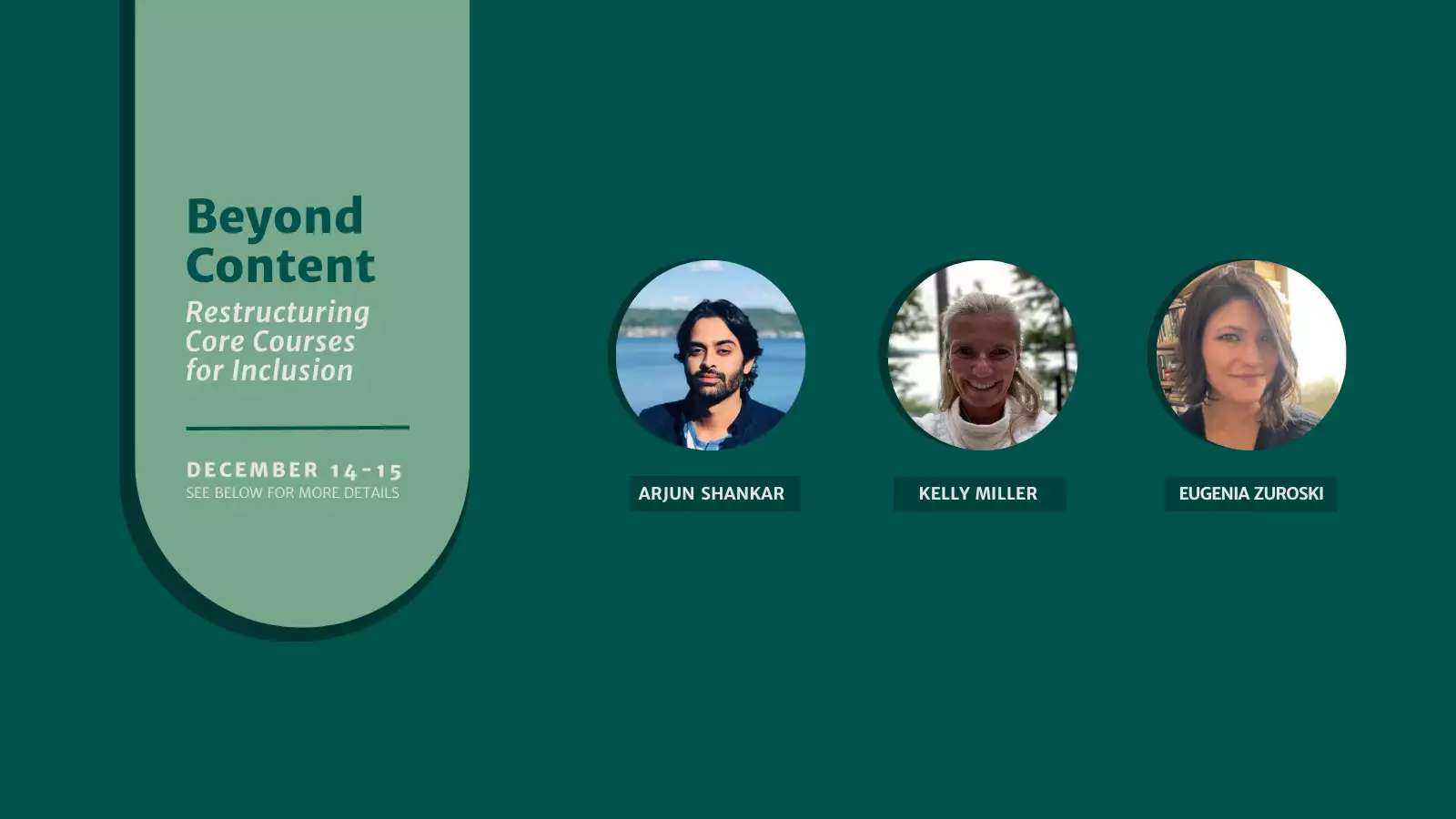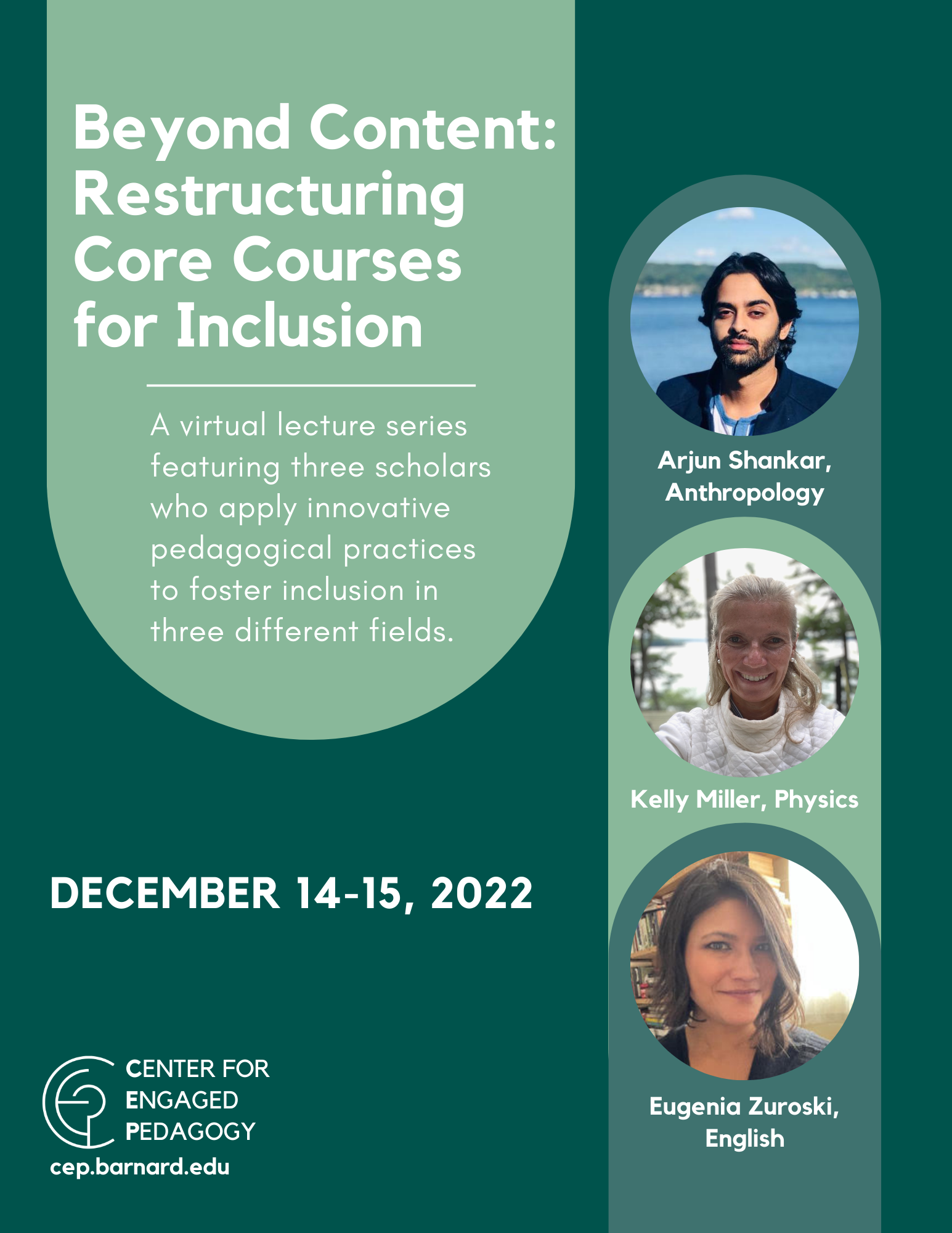Beyond Content 2022
Beyond Content 2022


The Center for Engaged Pedagogy invites you to our 2022 Beyond Content Series: Restructuring Core Courses for Inclusion. This will be a two-day lecture series featuring three scholars who apply innovative pedagogical practices to foster inclusion in three different fields. You can read more about each speaker and lecture below.
Registration for Beyond Content 2022 has closed.
Lecture Descriptions & Speaker Bios
DECEMBER 14, 1:30-3:00PM
This presentation will link the issue of mental unwellness to the commodification of curiosity within educational institutions. It will then argue that one role of the academician is to facilitate our students' annihilationist impulses, a means by which to cultivate their political will and help them in pushing against the commodification of their curiosity.
Dr. Shankar is an anthropologist, critical pedagogue, and mediamaker whose work falls into several broad areas. He is concerned with the politics of help and its role in upholding systems of racial capitalism. In his book, Brown Saviors and their Others (Duke, 2023), he takes India's burgeoning help economy, specifically the education NGO sector, as a site from which to interrogate these ideas. He shows how colonial, racial, and caste formations undergird how transnational and digitized NGO work is done in India today. Second, he is an advocate for Curiosity Studies (with Perry Zurn), an emerging interdisciplinary field which challenges us to think anew about scholarly production, pedagogic praxis, and the political role of the academician. Arjun asks: what might a radical curiosity make possible and what political, economic, and social constraints prevent the flourishing of curiosity?
DECEMBER 15, 10:30AM-12:00PM
Despite active learning being recognized as a superior method of instruction in the classroom, most college instructors around the world still choose traditional teaching methods. This talk will focus on best practices in active teaching strategies and how students’ perceptions of their own learning are often misleading. It will also discuss the importance of diversity in team-based learning as well as some of the challenges associated with assessment in these environments.
Kelly Miller is a Senior Lecturer in Applied Physics in the School of Engineering and Applied Science at Harvard University. She completed her Ph.D. in Applied Physics from Harvard in 2015. Prior to that, she received a Master's in Physics from the University of Vermont and completed her undergraduate education at McGill University.
Before graduate school, Kelly taught middle and high school science at various schools in Toronto, Rosseau, Montreal, and Vermont. She spent a year sailing around the world while teaching physics for Class Afloat, an experiential education program for high school students onboard a tall ship.
While teaching high school physics, Kelly developed a passion for teaching and scholarship in education. Her Ph.D. focused on the use of technology and interactive teaching strategies in undergraduate physics classrooms. At Harvard, Kelly teaches interactive, project-based courses in both physics and engineering. She is also a co-founder of Perusall, a collaborative reading platform to help get students prepared for class.
DECEMBER 15, 1:30-3:00PM
This talk considers how discourses of institutional “inclusion” shape the kinds of relationships we cultivate in university classrooms in the name of equity and diversity. Through an analysis of the “prepositional politics” of how people relate to one another in academic spaces, I argue that the model of inclusivity reproduces the university as a colonial enclosure of power. By thinking through the terms of living treaties between First Nations and settlers in the place where I live and teach, I consider alternative grammars of relation toward anticolonial pedagogies.
Eugenia Zuroski is Associate Professor of English and Cultural Studies at McMaster University, which is located on the colonized territories of the Haudenosaunee and Mississauga peoples. Trained in British literature of the long eighteenth century, her research considers the colonial legacies of that period and ongoing movements against them. She is Editor of the journal Eighteenth-Century Fiction, Vice President of the Council of Editors of Learned Journals, and publishes poetry in addition to scholarly writing.